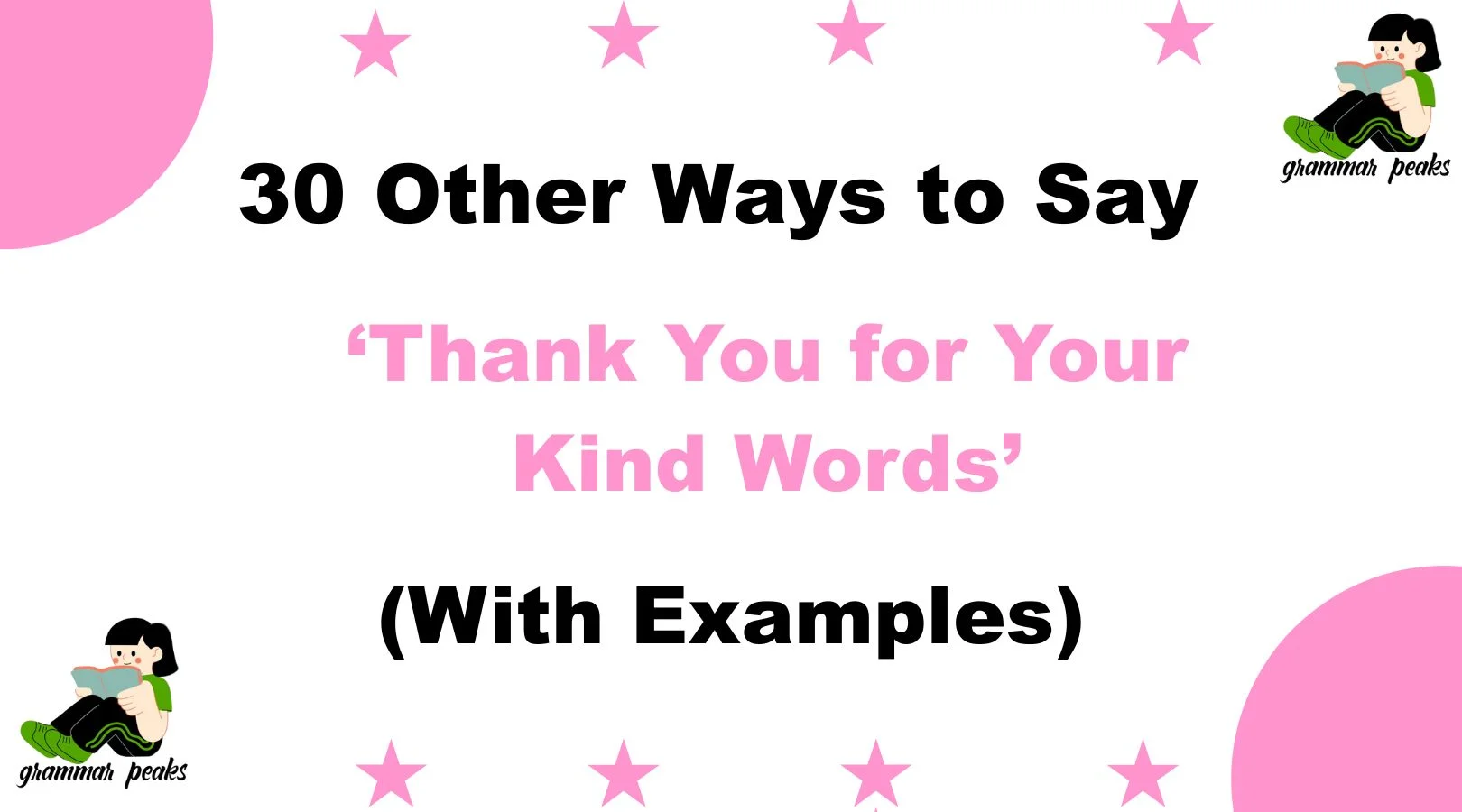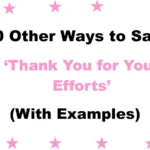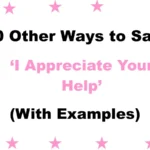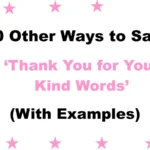In today’s fast-paced professional world, finding the right words to show appreciation goes a long way in building lasting relationships. A simple phrase like “Thank you for your kind words” is polite, but using more thoughtful, specific alternatives can make your response feel more sincere and personal.
Whether you’re replying to praise, encouragement, or support, the way you say thank you can reflect your character, professionalism, and emotional intelligence. Below, you’ll find 30 polished, warm, and professional alternatives to help you express genuine gratitude while keeping the tone respectful and kind.
What Does “Thank You for Your Kind Words” Mean?
“Thank you for your kind words” is a gracious phrase used to acknowledge and appreciate someone’s compliment, encouragement, or positive feedback. It signals gratitude and respect in a subtle, professional way.
Whether spoken or written, it tells the other person that their message meant something to you—and that you’re taking a moment to recognize it.
When to Use “Thank You for Your Kind Words”
- After Receiving Compliments
- In Response to Encouragement
- When Acknowledging Support
- In Appreciation of Empathy
Is It Professional or Polite to Say “Thank You for Your Kind Words”?
Absolutely. “Thank you for your kind words” is considered both professional and polite. It conveys emotional maturity and warmth while remaining respectful in formal contexts. Whether responding to a colleague, manager, client, or even a peer on LinkedIn, it shows that you value their expression and take it seriously. It’s a staple of modern business etiquette.
Pros or Cons of saying “Thank You for Your Kind Words”
Pros:
- Shows appreciation with emotional intelligence
- Keeps tone professional and polished
- Universally understood across industries
- Versatile for spoken or written communication
Cons:
- May sound generic or overused if repeated often
- Doesn’t specify what exactly was appreciated
- Lacks personalization without further context
Synonyms for “Thank You for Your Kind Words”
- I truly appreciate your kind message
- Your words meant a lot to me
- Thank you for taking the time to write that
- I’m grateful for your thoughtful note
- Your encouragement means so much
- I value your generous feedback
- I’m humbled by your kind sentiment
- It was touching to hear your words
- Your support is deeply appreciated
- I’m sincerely thankful for your kindness
- That really brightened my day
- Thanks for the uplifting message
- I appreciate your warmth and sincerity
- Your compassion did not go unnoticed
- I’m honored by your comments
- That was incredibly thoughtful of you
- I deeply value your kindness
- Your message brought a smile to my face
- Thanks for such encouraging words
- I’m beyond grateful for your words
- You’re very kind to say that
- I appreciate your empathy
- It means a lot coming from you
- Thank you for your heartfelt message
- I truly value your opinion
- I appreciate your positive energy
- That was very generous of you
- I respect and appreciate your support
- Your kindness made my day
- I feel lucky to receive your support
1. I truly appreciate your kind message
Definition: A warm and grateful way to acknowledge a thoughtful message.
Detailed Explanation: This phrase communicates not just appreciation, but also an emotional connection to the message itself. It works especially well in professional emails where you want to sound sincere but maintain decorum.
Scenario Example: Thank you again—I truly appreciate your kind message and your ongoing support.
Best Use: After receiving a positive email or comment from a colleague or client.
Worst Use: In casual text messages—it can come off as overly formal.
Tone: Warm, respectful, professional
2. Your words meant a lot to me
Definition: A personal way to express that someone’s words had a significant emotional impact.
Detailed Explanation: This phrase adds emotional weight and authenticity. It’s best used when you want the other person to know their message was not just heard—but felt.
Scenario Example: Your feedback during the meeting really boosted my confidence—your words meant a lot to me.
Best Use: During emotionally charged conversations or career milestones.
Worst Use: In routine workplace replies—it may sound too emotional.
Tone: Sincere, heartfelt, appreciative
3. Thank you for taking the time to write that
Definition: A respectful way to acknowledge someone’s effort in expressing kindness.
Detailed Explanation: This phrase shows that you not only appreciate the message, but also the time and intention behind it. It’s especially effective in professional settings where recognizing effort matters.
Scenario Example: Thank you for taking the time to write that—it truly lifted my spirits today.
Best Use: When someone sends a thoughtful email or long message.
Worst Use: When the message was extremely brief—can feel overkill.
Tone: Appreciative, respectful, professional
4. I’m grateful for your thoughtful note
Definition: A polished way to express thanks for a message that shows care.
Detailed Explanation: This version adds a layer of formality and professionalism, ideal for messages that were both sincere and structured.
Scenario Example: I’m grateful for your thoughtful note—it reminded me how strong our team spirit is.
Best Use: When replying to written feedback, cards, or professional letters.
Worst Use: In casual group chats—it might sound overly stiff.
Tone: Formal, gracious, reflective
5. Your encouragement means so much
Definition: A heartfelt way to express that someone’s support made an impact.
Detailed Explanation: This phrase focuses on the motivational effect of the kind words. It’s perfect when you feel uplifted by someone’s message and want to reflect that positivity.
Scenario Example: Your encouragement means so much, especially as I take on this new project.
Best Use: After receiving moral support during a big challenge.
Worst Use: If the comment was very brief or generic.
Tone: Uplifting, appreciative, genuine
6. I value your generous feedback
Definition: A professional and polite way to appreciate thoughtful comments or praise.
Detailed Explanation: This phrase combines professionalism with sincerity and is especially useful in formal emails, performance reviews, or career discussions.
Scenario Example: I value your generous feedback—it helps me improve and grow.
Best Use: During job reviews, mentorship conversations, or work evaluations.
Worst Use: In casual or peer-to-peer conversations—might sound too corporate.
Tone: Respectful, business-like, warm
7. I’m humbled by your kind sentiment
Definition: A modest and grateful way to accept praise or support.
Detailed Explanation: This phrase is useful when you want to express gratitude while remaining modest and grounded. It suits moments where someone’s words feel especially touching.
Scenario Example: I’m humbled by your kind sentiment—it really touched me.
Best Use: When the message is emotional, personal, or deeply respectful.
Worst Use: If the message was lighthearted or humorous—it might sound mismatched.
Tone: Humble, sincere, emotionally warm
8. It was touching to hear your words
Definition: A heartfelt way to show the message had an emotional impact.
Detailed Explanation: This phrase emphasizes the emotional connection made by the kind words. It’s great for deeper conversations or responses where emotions are involved.
Scenario Example: It was touching to hear your words after everything that’s happened.
Best Use: In farewell messages or during personal milestones.
Worst Use: In formal performance reviews or strictly business emails.
Tone: Personal, emotional, sincere
9. Your support is deeply appreciated
Definition: A formal and sincere way to acknowledge backing or encouragement.
Detailed Explanation: This works well in corporate communication, thank-you letters, or when addressing teams and clients, as it maintains diplomatic tone and clarity.
Scenario Example: Your support is deeply appreciated as we navigate these challenges together.
Best Use: In team emails, company-wide memos, or public responses.
Worst Use: For light personal compliments—it may sound too heavy.
Tone: Formal, professional, gracious
10. I’m sincerely thankful for your kindness
Definition: A deeply appreciative way to express gratitude with emotional depth.
Detailed Explanation: This alternative helps you emphasize genuine gratitude while keeping a warm and polished tone. It’s appropriate in both personal and professional settings.
Scenario Example: I’m sincerely thankful for your kindness during this transition.
Best Use: In resignation messages, condolence replies, or team appreciations.
Worst Use: In brief, informal chats—it could seem overly serious.
Tone: Grateful, polished, heartfelt
11. That really brightened my day
Definition: A warm way to let someone know their message had a positive emotional impact.
Detailed Explanation: This phrase shows appreciation while highlighting how much someone’s words uplift your mood or make your day more enjoyable.
Scenario Example: That really brightened my day—thank you for thinking of me.
Best Use: After receiving an unexpected compliment or message of support.
Worst Use: In very formal or serious business settings—it may sound too casual.
Tone: Warm, cheerful, appreciative
12. Thanks for the uplifting message
Definition: A simple, professional way to thank someone for motivating or positive words.
Detailed Explanation: This version emphasizes the encouraging tone of the message, making it great for maintaining optimism in professional or personal communications.
Scenario Example: Thanks for the uplifting message—it gave me just the boost I needed.
Best Use: In response to motivational feedback or supportive notes.
Worst Use: If the message was neutral or lacked emotional tone—it may feel exaggerated.
Tone: Positive, polite, uplifting
13. I appreciate your warmth and sincerity
Definition: A graceful way to express thanks for heartfelt, honest words.
Detailed Explanation: This phrase is especially suitable when someone has been emotionally open or particularly compassionate in their message.
Scenario Example: I appreciate your warmth and sincerity—it really means a lot during this time.
Best Use: When someone has shown emotional depth in their kind words.
Worst Use: If the message was light or humorous—it may sound too serious.
Tone: Genuine, empathetic, heartfelt
14. Your compassion did not go unnoticed
Definition: A professional and respectful way to acknowledge someone’s emotional support.
Detailed Explanation: It’s ideal when you want to highlight that you’ve truly recognized and valued someone’s kindness, even if you didn’t respond right away.
Scenario Example: Your compassion did not go unnoticed—thank you for checking in with me.
Best Use: In professional settings where compassion may not be overt but is impactful.
Worst Use: In highly casual conversations—it can sound overly formal.
Tone: Respectful, appreciative, sincere
15. I’m honored by your comments
Definition: A humble way to accept praise while maintaining professionalism.
Detailed Explanation: This response adds a touch of modesty and class, perfect when responding to compliments from higher-ups or respected peers.
Scenario Example: I’m honored by your comments—thank you for your encouraging words.
Best Use: When receiving praise from a client, executive, or leader.
Worst Use: Among close friends—it may feel too formal or detached.
Tone: Polished, humble, respectful
16. That was incredibly thoughtful of you
Definition: A kind way to recognize someone’s intentional kindness.
Detailed Explanation: This phrase spotlights how much consideration and care the person put into their message, reinforcing a deeper level of appreciation.
Scenario Example: That was incredibly thoughtful of you—I truly appreciate the support.
Best Use: In both professional and personal messages involving emotional care.
Worst Use: For short or generic compliments—it may feel out of proportion.
Tone: Appreciative, kind, thoughtful
17. I deeply value your kindness
Definition: A sincere way to recognize and express gratitude for someone’s kind nature.
Detailed Explanation: This is a heartfelt phrase for moments where you’ve been genuinely moved by someone’s words or support.
Scenario Example: I deeply value your kindness—it helped more than you know.
Best Use: When responding to messages of support during emotional or transitional times.
Worst Use: In high-stakes corporate communication—may sound too emotional.
Tone: Sincere, heartfelt, emotional
18. Your message brought a smile to my face
Definition: A warm and relatable way to show appreciation for uplifting words.
Detailed Explanation: This phrase adds a personal touch, making the conversation genuine and friendly, especially in digital communication where tone can be hard to read.
Scenario Example: Your message brought a smile to my face—thank you for your kind words.
Best Use: For light-hearted and warm compliments or cheerful messages.
Worst Use: When the message is formal or serious—it may come off too casual.
Tone: Friendly, cheerful, sincere
19. Thanks for such encouraging words
Definition: A polite and simple way to express gratitude for motivational comments.
Detailed Explanation: This phrase fits well in positive exchanges, especially when someone goes out of their way to uplift or support you with their words.
Scenario Example: Thanks for such encouraging words—they gave me confidence.
Best Use: After receiving professional motivation or career-related praise.
Worst Use: In high-level formal reports or legal documentation.
Tone: Encouraging, respectful, upbeat
20. I’m beyond grateful for your words
Definition: A highly appreciative phrase used for heartfelt messages.
Detailed Explanation: This statement takes the gratitude a step further, expressing a deeper emotional connection to the message received.
Scenario Example: I’m beyond grateful for your words—they arrived just when I needed them most.
Best Use: When someone’s message made a meaningful emotional impact.
Worst Use: For short messages or general compliments—it might sound exaggerated.
Tone: Deeply thankful, emotional, sincere
21. You’re very kind to say that
Definition: A courteous and modest reply to kind feedback.
Detailed Explanation: This is a great phrase to use when you want to acknowledge someone’s compliment while keeping a humble tone.
Scenario Example: You’re very kind to say that—I truly appreciate it.
Best Use: In professional or semi-formal exchanges.
Worst Use: When a direct thank-you is more appropriate.
Tone: Gracious, polite, modest
22. I appreciate your empathy
Definition: A respectful way to thank someone for emotionally resonant comments.
Detailed Explanation: This phrase acknowledges that someone has shown emotional understanding or support, which often matters more than advice or praise.
Scenario Example: I appreciate your empathy—it made a big difference today.
Best Use: When discussing a personal or challenging situation.
Worst Use: For generic professional praise—it may feel mismatched.
Tone: Compassionate, respectful, warm
23. It means a lot coming from you
Definition: A personal way to show that the sender’s identity adds value to the message.
Detailed Explanation: This phrase adds weight to the compliment, signaling that the sender’s opinion is highly respected or cherished.
Scenario Example: It means a lot coming from you—I’ve always valued your perspective.
Best Use: When the person offering praise is a mentor, leader, or someone you admire.
Worst Use: When said sarcastically or in group chats—it can feel passive-aggressive.
Tone: Personal, respectful, sincere
24. Thank you for your heartfelt message
Definition: A formal yet warm way to acknowledge emotionally sincere communication.
Detailed Explanation: This phrase works well when someone has clearly put time and emotion into what they’ve said or written.
Scenario Example: Thank you for your heartfelt message—I’ll carry those words with me.
Best Use: In farewell messages, milestone moments, or loss situations.
Worst Use: For casual interactions—it may sound too heavy.
Tone: Emotional, respectful, warm
25. I truly value your opinion
Definition: A polished way to thank someone for sharing their honest thoughts.
Detailed Explanation: This expression works well when the message includes a mix of encouragement and insight—especially in professional conversations.
Scenario Example: I truly value your opinion—your perspective always helps.
Best Use: After receiving thoughtful comments or constructive praise.
Worst Use: If the message lacked depth or detail—it may sound too formal.
Tone: Respectful, thoughtful, appreciative
26. I appreciate your positive energy
Definition: A casual and enthusiastic way to acknowledge someone’s uplifting presence.
Detailed Explanation: This response highlights the overall vibe someone brings through their message—not just the words themselves.
Scenario Example: I appreciate your positive energy—it’s always contagious!
Best Use: In peer-to-peer or informal professional settings.
Worst Use: In formal or legal writing—it may feel unprofessional.
Tone: Casual, energetic, upbeat
27. That was very generous of you
Definition: A polished way to express thanks for a compliment or kind act.
Detailed Explanation: This phrase balances humility and respect, especially when someone goes out of their way to say something thoughtful.
Scenario Example: That was very generous of you—I’m truly touched.
Best Use: In professional praise or mentorship situations.
Worst Use: If sarcasm is suspected—it may come across insincere.
Tone: Gracious, polished, warm
28. I respect and appreciate your support
Definition: A mature and composed way to thank someone for their kindness.
Detailed Explanation: This phrase emphasizes not just gratitude, but mutual respect—important in leadership, teamwork, or peer situations.
Scenario Example: I respect and appreciate your support—it’s made a difference.
Best Use: In professional networks, feedback sessions, or business relationships.
Worst Use: In personal or humorous chats—it can feel too formal.
Tone: Mature, respectful, appreciative
29. Your kindness made my day
Definition: A warm, casual phrase used to express deep appreciation for someone’s kindness.
Detailed Explanation: This lets someone know that their message had a direct positive effect, and is great for making the interaction feel more human.
Scenario Example: Your kindness made my day—thank you for being so thoughtful.
Best Use: In day-to-day interactions with coworkers, friends, or clients.
Worst Use: When the message wasn’t especially kind—it may sound exaggerated.
Tone: Friendly, sincere, light
30. I feel lucky to receive your support
Definition: A heartfelt expression of appreciation for someone’s presence and encouragement.
Detailed Explanation: This phrase blends gratitude and emotion, signaling how much you value their kind words and ongoing presence.
Scenario Example: I feel lucky to receive your support—thank you for being there.
Best Use: In deep personal conversations or strong professional connections.
Worst Use: In brief or one-time chats—it may feel too intense.
Tone: Emotional, appreciative, sincere
Conclusion
Finding the right words to express appreciation can transform a simple thank-you into a moment of genuine connection. Whether you’re replying to a heartfelt compliment or a thoughtful gesture, using the right phrase helps your message feel more personal, sincere, and professional.
These 30 alternatives to saying “Thank you for your kind words” allow you to match the tone, depth, and relationship of your communication. From formal emails to friendly chats, each option helps you show gratitude with authenticity and warmth—leaving a lasting impression.
FAQs
1. What is the most professional way to say “Thank you for your kind words”?
The most professional option is: “I sincerely appreciate your thoughtful message.”
This version maintains a formal tone while showing genuine gratitude, making it ideal for corporate emails, client communication, and leadership correspondence.
2. Can I use these alternatives in both emails and face-to-face conversations?
Yes, you can use most of these alternatives in both formats.
For emails, stick with options like “I’m honored by your comments” or “Thank you for your heartfelt message.” For spoken conversations, lighter phrases like “That really brightened my day” or “You’re very kind to say that” work well.
3. Are these responses appropriate for client communication?
Absolutely—just choose based on tone.
When speaking to a client or customer, go for respectful, polished options such as:
• “I truly value your opinion”
• “I’m beyond grateful for your words”
• “That was very generous of you.”
They strike the right balance between professionalism and warmth.
4. What should I avoid when replying to kind words professionally?
Avoid being too casual or too vague.
Phrases like “Cool, thanks!” or “Nice of you to say” might sound dismissive in professional settings. Also, avoid sarcasm, which can undermine the genuine appreciation someone showed.
5. How can I make my appreciation message stand out?
Personalise your response and match the sender’s tone.
Mention what specifically touched you and add context. For example:
“Your message brought a smile to my face—especially after a long day. I’m grateful for your kindness.”
This creates a memorable, meaningful reply that shows you truly took their words to heart.






